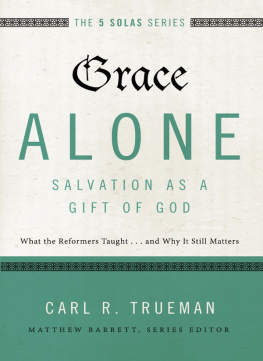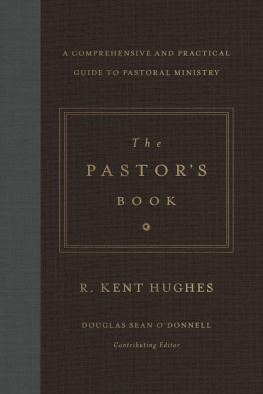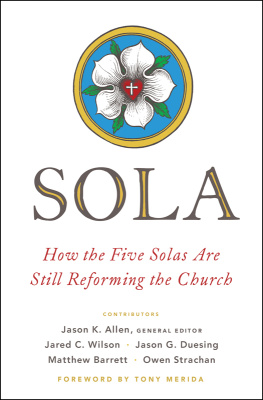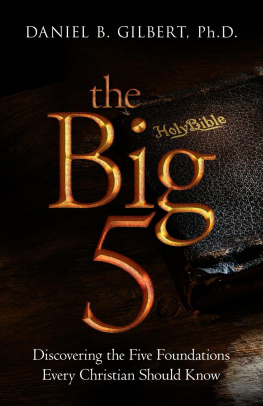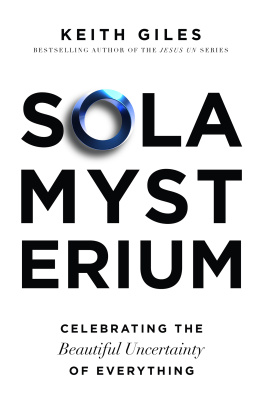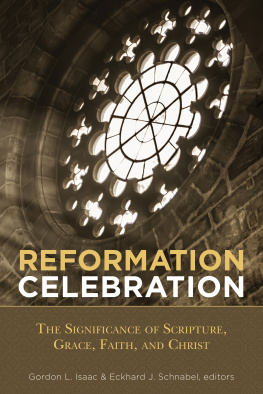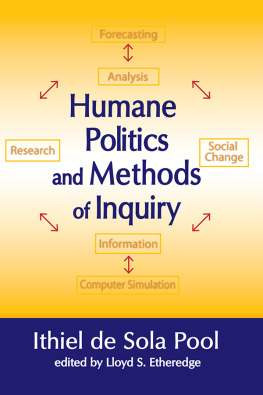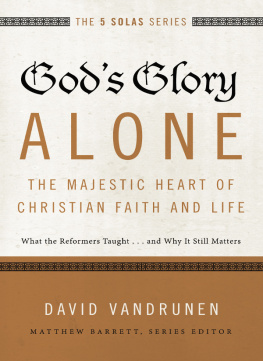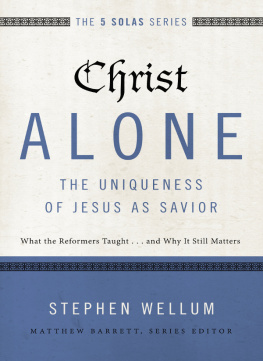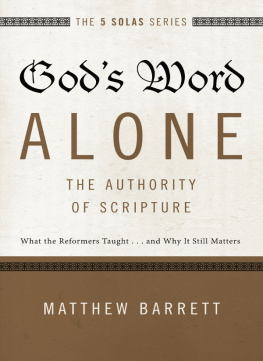Trueman takes complex biblical and theological ideas and makes them easy to understand. The key message is that Gods grace, healing our sinful neediness, is at the heart of true biblical piety. Trueman develops this theme with relation to the church, preaching, sacraments, and prayer. As a Catholic, I resonated deeply with Truemans portrait of biblical piety, and I found much else to treasureincluding his emphasis on the priority of Gods action and his stirring account of the ministry of preaching. This is a book that will instruct everyone who loves the gracious Lord Jesus Christ.
M ATTHEW L EVERING , James N. and Mary D. Perry Jr. Chair of Theology, Mundelein Seminary
Grace is a word so common in our day and age as to border on the clich. Yet prizing the gospel means treasuring grace. Carl Trueman does us all the service, then, of helping to make connections that are crucial: between grace and the active presence of the triune God, between the promises of the Old Testament and the intervention recounted in the New, between the ancient faith of the early fathers and later Protestant reforms, and between a rich theology of grace and its necessary implications for piety and worship. This book brings remarkable biblical, historical, and pastoral perspective to an oftentimes ambiguous but genuinely amazing reality.
M ICHAEL A LLEN , Reformed Theological Seminary, Orlando, Florida
This is an outstanding book on an extraordinary subject. It clearly explains the biblical foundations of grace and navigates the historical debates in a way that is both highly engaging and deeply informed. Perhaps even more importantly, the practical applications of graceboth for individuals and for churchesare sharply driven home. I am grateful this book was written, and I highly commend it to any and all who are interested in learning more about the matchless grace of the triune God.
J ONATHAN L. M ASTER , Professor of Theology and Dean of the School of Divinity, Cairn University
Trueman, a master of the art of making historical texts of the Christian tradition relevant and applicable for use in our time, effectively presents the ways in which Augustine, Aquinas, Luther, and Calvin put the foundational biblical concept of grace to work in their day. This serves him well as a basis for a lively exploration of how Gods grace functions in the church today through the proclaimed Word of God, the sacraments, and believers prayer. This volume demonstrates how grace, as the lively disposition of God in Christ, frames Gods dealing with a sinful world as Trueman confesses its significance for the twenty-first century.
R OBERT K OLB , Professor of Systematic Theology emeritus, Concordia Seminary, Saint Louis
Where is grace? What is grace? Who is grace? And how is it conferred to us? I resonate with Truemans lament that grace has become an empty sentiment in much of contemporary Christian literature. What does the Reformation cry grace alone really mean? And why is it so important today? To answer these questions, Trueman gives us both a history and a theology of grace. He shows the reader that grace is confrontational, that one cant have a proper understanding of grace without a proper understanding of sin. Read this book to learn what a grace-alone church takes seriously.
A IMEE B YRD , author of No Little Women, Theological Fitness, and Housewife Theologian; Director of Womens Initiatives at The Alliance of Confessing Evangelicals, and cohost on Mortification of Spin podcast.
Carl Trueman is always worth reading. I am especially eager to recommend this excellent volume on the Protestant battle cry grace alone. It is obvious that it comes from one who is both a scholar and a churchman. It at once challenges the mind and warms the heart with the grand theme of Gods gracious salvation. This is a book to be savored.
T ODD P RUITT , pastor, Covenant Presbyterian Church, Harrisonburg, Virginia
The Five Solas Series
Edited by Matthew Barrett
Books in Series:
Gods Word AloneThe Authority of Scripture
by Matthew Barrett
Christ AloneThe Uniqueness of Jesus as Savior
by Stephen Wellum
Grace AloneSalvation as a Gift of God
by Carl Trueman
Faith AloneThe Doctrine of Justification
by Thomas Schreiner
Gods Glory AloneThe Majestic Heart of Christian Faith and Life
by David VanDrunen
ZONDERVAN
Grace AloneSalvation as a Gift of God
Copyright 2017 by Carl R. Trueman
Requests for information should be addressed to:
Zondervan, 3900 Sparks Dr. SE, Grand Rapids, Michigan 49546
ePub Edition March 2017: ISBN 978-0-310-51577-7
Unless otherwise noted, Scripture quotations are taken from The Holy Bible, New International Version, NIV. Copyright 1973, 1978, 1984, 2011 by Biblica, Inc. Used by permission of Zondervan. All rights reserved worldwide. www.Zondervan.com. The NIV and New International Version are trademarks registered in the United States Patent and Trademark Office by Biblica, Inc.
Scripture quotations marked ESV are from the ESV Bible (The Holy Bible, English Standard Version). Copyright 2001 by Crossway, a publishing ministry of Good News Publishers. Used by permission. All rights reserved.
Any Internet addresses (websites, blogs, etc.) and telephone numbers in this book are offered as a resource. They are not intended in any way to be or imply an endorsement by Zondervan, nor does Zondervan vouch for the content of these sites and numbers for the life of this book.
All rights reserved. No part of this publication may be reproduced, stored in a retrieval system, or transmitted in any form or by any meanselectronic, mechanical, photocopy, recording, or any otherexcept for brief quotations in printed reviews, without the prior permission of the publisher.
Cover design: Chris Tobias/Outerwear for Books
Interior design: Denise Froehlich
17 18 19 20 21 22 23 24 25 /DHV/ 14 13 12 11 10 9 8 7 6 5 4 3 2 1
For Mark, Jen, and Alicia
Contents
, R. Kent Hughes
W hat doctrines could be more foundational to what it means to be an evangelical Protestant than the five solas (or solae) of the Reformation? In my experience, however, many in evangelical churches today have never heard of sola Scriptura (Scripture alone), sola gratia (grace alone), sola fide (faith alone), solus Christus (Christ alone), and soli Deo gloria (glory to God alone).
Now it could be that they have never heard the labels but would recognize the doctrines once told what each sola means. At least I pray so. But my suspicion is that for many churchgoers, even the content of these five solas is foreign, or worse, offensive. We live in a day when Scriptures authority is questioned, the exclusivity of Christ as mediator as well as the necessity of saving faith are offensive to pluralistic ears, and the glory of God in vocation is diminished by cultural accommodation as well as by individual and ecclesiastical narcissism. The temptation is to think that these five solas are museum pieces of a bygone era with little relevance for todays church. We disagree. We need these solas just as much today as the Reformers needed them in the sixteenth century.
The year 2017 will mark the 500th anniversary of the Reformation. These five volumes, written by some of the best theologians today, celebrate that anniversary. Our aim is not merely to look to the past but to the present, demonstrating that we must drink deeply from the wells of the five

